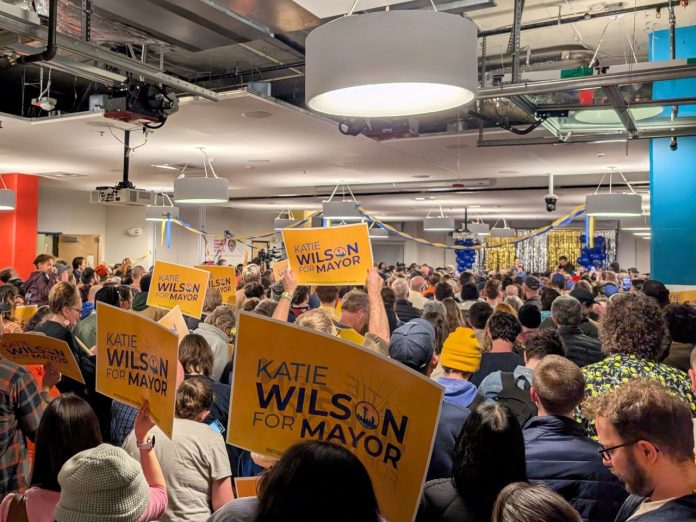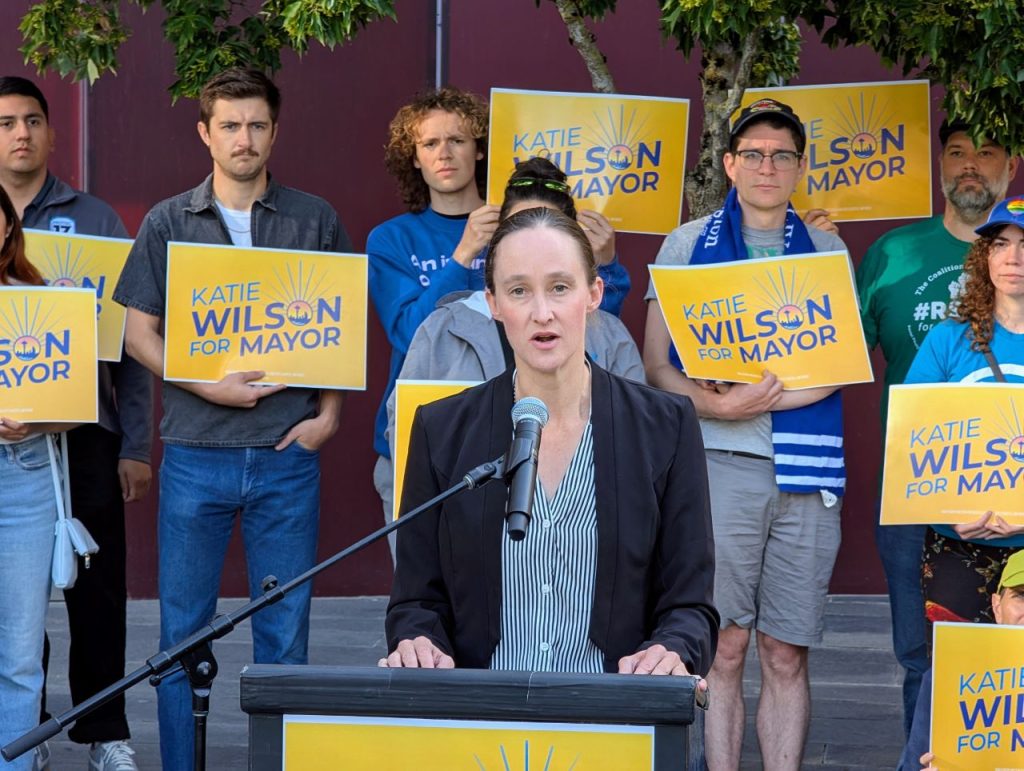
Seattle Mayor Bruce Harrell led progressive challenger Katie Wilson in early results by a 53% to 46% margin Tuesday night. Around half of the votes projected to be cast had been counted on election night in Washington state’s vote by mail system. Due to the fact that later results typically favor progressive candidates, this race is set to be a nailbiter.
Wilson gained a larger margin in the primary than she would need to win now, going from leading by 1.4 points on election night to a nearly 10-point margin in final results. Progressives have pulled off similar late surges in other years as well — most famously Kshama Sawant, whose largest swing in margin was 13 points in 2019. That history suggests this race is far from over.
Even progressive candidates that failed to catch fire saw a large swing from election night to final results. In 2021, Lorena González’s margin narrowed 12 points — though she still lost to Harrell by 17 points. In 2017, mayoral candidate Cary Moon gained 8 points on Jenny Durkan by the time final results were certified.
A jubilant mood at Wilson’s packed election night party at Centilia Cultural Center in Beacon Hill turned a bit anxious as first results were posted. Wilson acknowledged the race could go either way and pledged effort at ballot curing to help close the gap if necessary. She also expressed pride in the campaign they ran.
“I am just so proud of all of you,” Wilson told supporters at her election night party. “I’m so proud that we ran a campaign rooted in hope for the future, not fear or anger. I’m proud that we ran a clean campaign criticizing the incumbent’s record and policies, but not going after his character, his lifestyle, his family or his past.”
The last comment seemed to be a dig at Harrell for his personal attacks on her, which included criticizing her for taking financial help from her parents to help with child care costs during the campaign. Harrell increasingly went negative on his opponent down the stretch.
“If we prevail in this race, which is very possible, I want everyone in this great city of ours to have a roof over their head,” Wilson added. “I want world class transit [and] stable, affordable housing for renters.”
At his election night party, Harrell acknowledged that the race was likely to be a “nailbiter.” He also said he liked the position he was in, preferring to take a glass half-full view. If re-elected, Harrell would be Seattle’s first two-term mayor since Greg Nickels in 2005.
The road to a close race
Before Wilson entered the race in March, Harrell had appeared a lock for reelection, with a big campaign war chest and momentum still theoretically spilling over from his decisive win in 2021. That advantage quickly evaporated as primary voters swung toward Wilson.
Hoping to blaze a similar path as Mayor-Elect Zohran Mamdani in New York City, Wilson could pull off a political upset over a scion of the centrist Democratic establishment.
Co-founder of the Seattle Transit Riders Union, Wilson cobbled together a broad grassroots coalition on the strength of her affordability-focused message. The Urbanist Elections Committee (of which I am a member) endorsed Wilson, as did The Stranger. PROTEC 17, a labor union that represents public workers, endorsed Wilson just before primary.

A number of big endorsements swung toward her following a primary win that appeared to catch many by surprise. For example, the MLK County Labor Council sole endorsed Harrell in the primary, but switched to a dual endorsement in the primary, as did King County Councilmember Teresa Mosqueda.
On the flip side, Harrell campaigned much harder after the primary’s wake up call, holding frequent press events. Plus, wealthy donors, largely corporate and real estate moguls, funneled more than $1.8 million into a pro-Harrell political action committee (PAC) helmed by Harrell’s Senior Deputy Mayor Tim Burgess. A progressive PAC set up to support Wilson, boosted by major donations from PROTEC 17 and the United Food and Commercial Workers International Union (UFCW) raised just over $400,000.
Progressives cleaning up in other Seattle races
While the mayor’s race is set to be a photo finish, Urbanist-endorsed progressives opened up huge leads in Seattle City Council races. Housing lawyer Eddie Lin led Adonis Ducksworth, a transportation adviser to Bruce Harrell, grabbing 68% of the vote in election night results. Progressive nonprofit leader Dionne Foster led Seattle Council President Sara Nelson, winning 58% of the vote, and Councilmember Alexis Mercedes Rinck has nearly 79% of the early vote. Rinck leads Council’s progressive wing and is the only Seattle incumbent in a strong position.
Urbanist-endorsed challenger Erika Evans is also leading Republican Seattle City Attorney Ann Davison by a wide margin — 62% to 37%.
Progressive margins are likely to grow in subsequent ballot drops. The progressive surge usually materializes in ballot drops on Thursday and Friday. Next Monday’s drop is likely to be the last sizeable one, but with an additional opportunity to close up a gap.
At the county level, King County Councilmember Girmay Zahilay is ahead in a close race to become the first new county Executive elected since 2009. Zahilay leads fellow Councilmember Claudia Balducci by around 1.5%, making him the favorite in the days ahead. (The Urbanist endorsed Balducci.)
Thursday Update: Harrell won the Wednesday drop of about 21,000 ballots with 56%, expanding his lead on Wilson from 7 points to 8 points. Wilson won Thursday’s drop of about 36,000 ballots 51.6% to 48.1%, cutting into his margin. Harrell’s lead stands at 5.7% or 9,908 votes. As of Thursday, 175,739 ballots have been counted in the Seattle race, and at least 103,700 ballots remained to be counted.
🚨 In the latest tally, Katie Wilson has gained vote share in the Seattle mayoral race. Today's batch broke 51.63% for Wilson and 48.11% for Bruce Harrell. Harrell still leads with 52.64% of the vote while Wilson still trails with 46.93% of the vote.
— The Urbanist (@theurbanist.org) November 6, 2025 at 3:43 PM
[image or embed]
The race is still far from over, but Wilson will likely need to win future drops by larger margins.
Doug Trumm is publisher of The Urbanist. An Urbanist writer since 2015, he dreams of pedestrian streets, bus lanes, and a mass-timber building spree to end our housing crisis. He graduated from the Evans School of Public Policy and Governance at the University of Washington in 2019. He lives in Seattle's Fremont neighborhood and loves to explore the city by foot and by bike.


